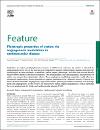Pleiotropic properties of statins via angiogenesis modulation in cardiovascular disease

View/
Publisher version (Check access options)
Check access options
Date
2022-10-31Metadata
Show full item recordAbstract
Inhibition of hydroxymethylglutaryl-coenzyme A (HMG-CoA) reductase by statins is affected by inhibiting the active site of the enzyme in a competitive manner. Statins reduce plasma cholesterol by inhibiting its de novo synthesis. In addition, statins impart ‘pleiotropic’ activities that do not directly relate to their ability to decrease cholesterol. The proangiogenic and antiangiogenic characteristics of statins are among these pleiotropic effects. These angiogenic-modifying properties could offer new therapeutic applications. Statins stimulate or suppress angiogenesis in a biphasic manner. Whereas low doses of statin stimulate angiogenesis, high doses reduce protein prenylation and limit cell development and angiogenesis. In this review, we discuss how statins impact angiogenesis, with a particular focus on angiogenesis in stroke and cardiovascular disease (CVD).
Collections
- Medicine Research [1820 items ]


